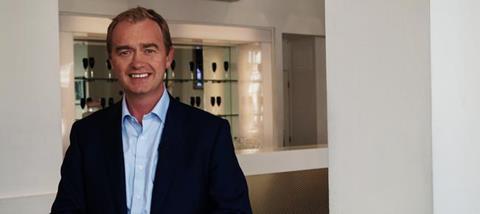
Why shouldn’t we be able to express a view on human sexuality that is traditional and biblical?
Why shouldn’t we be able to say that we think the best environment for bringing up children is usually with a mum and a dad? And why shouldn’t we be able to decline a request to bake a cake with a message supporting gay marriage?
Views which just 20 years ago were regarded as normal are now abnormal. You might lose your job or end up in court for expressing these views publicly. Just look at the treatment of Ashers Bakery (who were taken to court after refusing to bake a cake supporting gay marriage) or Richard Page (a Christian magistrate who was sacked for speaking against same sex adoption) and you'll see that we now live in a society where it is unacceptable to voice opinions that are traditional and biblically-based.
Tim Farron might agree. As he resigned from his very public role as leader of the UK Liberal Democrats he made the point that his Christian faith is in direct conflict with his role as a political leader in modern-day Britain.
During the election campaign Farron was repeatedly asked by journalists "is gay sex a sin?". But 'Sin' is a word that has lost its meaning in society so the question is dubious. The journalist asking the question was almost certainly - and successfully - using 'sin' as a blunt instrument to create a headline, rather than ask a serious question about faith.
And of course the irony here is that Tim Farron is far from a fundamentalist or even conservative Christian. He supports same sex marriage and his views are (unsurprisingly) liberal. Even so Farron felt forced to say: "I seem to be the subject of suspicion because of what I believe and who my faith is in. In which case we are kidding ourselves if we think we yet live in a tolerant, liberal society."
Are we kidding ourselves?
Secular commentators like to point out that faith presents a dangerous threat to an open liberal society. 'Faith' may be tolerable at times of national ceremony (a royal wedding) or personal ceremony (births, deaths, marriages) but otherwise needs to be kept locked away from real-life. It’s something you choose to do if you feel like it but in private, please.
Secularists often say that public faith is not only irrelevant but dangerous and intolerant. Yet they fail to see that their position is itself intolerant. It is a worldview, and it does not tolerate any other worldview. Some have remarked this is not so much secularism as 'theophobia'.
A recent episode of Premier Christian Radio's Unbelievable featured a lively and bruising debate between Canadian theologian Joe Boot and President of the National Secular Society, Terry Sanderson. With great insight and passion Boot reviews several recent cases where Christian opinion has been suppressed. Additionally, he describes the case of an (atheist!) Canadian academic being hounded for his refusal to use gender neutral pronouns such as Zir, Zim or Ne instead of the traditional him, her etc. While we should honour the way people view their identity, the refusal to use these words doesn’t make you some kind of bigot.
Boot goes on to conclude that Christians championing traditional biblical views are now effectively regarded by society as heretics. They are stating views which do not conform to the politically correct agenda and they cannot be tolerated. This criticism is directed at Christians who are regarded as soft targets. There do not appear to be similar complaints made against Muslims for example. Boot believes this is down to personal fear. Demanding that a Muslim baker bake a cake with a cartoon of the prophet Mohammed could put you in fear of your life.
How do we face the future?
We seem to be at a tipping point in public dialogue. Interestingly Tim Farron’s resignation may even help to alert our media and general public to this fact. In the meantime, we need to think about how we can move forward.
First, let's recognise Christians are in a minority and the Church is on the margins of our society. We need to get used to that reality.
But it is not all negative. People are just as interested in spirituality as they ever were. They just don’t see that the Church has relevant answers – and that’s partly down to us.
As Christians we need to learn to express our values and beliefs in ways that do not appear openly and overtly religious. With some humility and more testimonial than dictatorial. And we need to defend the right of people of any faith and no faith to express their views sensitively, but without fear of immediate censure, in a climate of extreme political correctness.



























